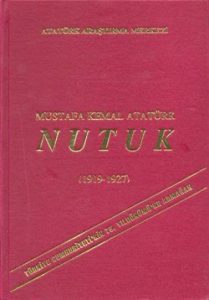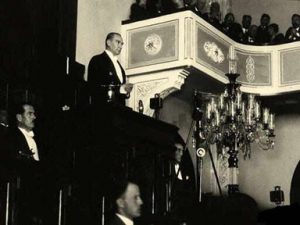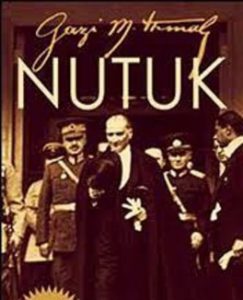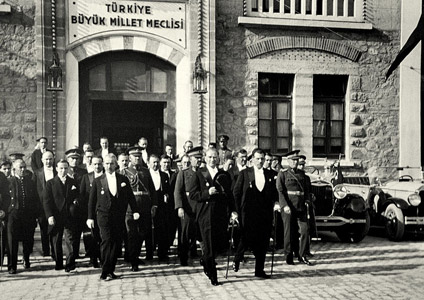Dedicated To: “19 May 1881: ATATURK at 130 ” & “19 May 1919”
“The foundations of the Ottoman Empire were themselves shattered at that time. lts existence was threatened with extermination.”
Gentlemen,
I landed at Samsun on the l9 May, l9l9. This was the position at that time:
The group of Powers which included the Ottoman Government had been defeated in the Great War. The Ottoman Army had been crushed on every front. An armistice had been signed under severe conditions. The prolongation of the Great War had left the people exhausted and impoverished.
Those who had driven the people and the country into the World War had fled and now cared for nothing but their own safety. Vahdettin, the degenerate occupant of the throne and the Caliphate, was seeking for some despicable way to save his person and his throne, the only objects of his anxiety. The Cabinet, of which Damat Ferit Pasha was the head, was weak and lacked dignity and courage. lt was subservient to the will of the Sultan alone and agreed to every proposal that could protect its members and their sovereign.

The Army had been deprived of their arms and ammunition, and this state of affairs continued.
The Entente Powers did not consider it necessary to respect the terms of the armistice. On various pretexts, their men-of-war and troops remained at Istanbul. The Vilayet of Adana was occupied by the French; Urfa, Maras,
Antep, by the English. ln Antalya and Konya were the Italians, whilst at Merzifon and Samsun were English troops. Foreign officers and officials and their special agents were very active everywhere. At last, on the l5th of
May, that is to say, four days before the following account of events begins, the Greek Army, with the consent of the Entente Powers, had landed at Izmir.
Christian elements were also at work all over the country, either openly or in secret, trying to realize their own particular ambitions and thereby hasten the breakdown of the State.
Certain information and authentic documents that fell into our hands, later on, prove that the Greek organisation “Mawrimira’’ (Document I) established by the patriarchate in Istanbul, was forming bands, organising meetings and making propaganda in the vilayets. The Greek Red Cross and the official Emigrants Commission supported the work of the “Mawrimira.”
The formation of Boy Scouts in the Greek schools directed by the “Mawrimira” was reinforced by the admission even of young men over twenty years of age.

The Armenian Patriarch, Zaven Efendi, also worked in connection with die “Mawrimira.’’ The preparations made by the Armenians progressed side by side with those made by the Greeks.
A society called the “Pontus’’ at Trabzon, Samsun and other places along the whole of the Black Sea coast, having their headquarters in Istanbul, worked openly and successfully. (Document 2.)
On account of the appalling seriousness of the situation which was apparent everywhere. particularly in all the vilayets, certain prominent personalities had begun to develop countermeasures to improve the situation. This resulted in new organisations being started. Thus. for instance, there were unions or societies at Edirne and surrounding districts called “Trakya – Pasaeli”. ln the east (Document 3), at Erzurum and Elazig (Document 4), the “Union of Defence of the National Rights of the Eastern Provinces” had been formed, also with their headquarters in Istanbul. Again, in Trabzon there was a society called the “Defense of Rights” and in Istanbul a “League for the Separation of Trabzon and its District.” Through the exertions of the members of this league (Document 5 – 6), sub-committees had been established at of and in the district of Lazistan.
Some of the young patriots at Izmir, who since the 13th May had noticed distinct indications of the approaching occupation of the town, had held meetings about the distressing condition of affairs during the night of
the I4″‘, and in principle had agreed to oppose the occupation by the Greeks, which at that time was considered to be practically an accomplished fact. designed to end in annexation, and resisted it on the principle of “no
annexation.`° During the same night, those of the inhabitants who were able to meet at the Jewish cemetery at Izmir drew up a protest and spread it broadcast. But as the Greek troops actually landed on the following morning this attempt failed to achieve the desired result.
I would like to give you a short account of the object and political aims of these organisations.
I had already had a conversation in Istanbul with some of the leaders of the “Trakya- Pasaeli” Society. They considered that the breakdown of the Ottoman Empire was extremely probable. In the face of the threatened danger of the dismemberment of their country. their first thought was to save Eastern Trakya and later on if possible, to form a Turco-Mohamedan community that would include Western Trakya. The only way by which they thought they could realize this aim was to put their trust in England or, if this was not possible, in France. With this object, they tried to get into touch with certain political personalities belonging to foreign countries. lt was believed that their intention was to establish a Traltya Republic.

The object of the “Defence of the National Rights of the Eastern Provinces Union,” on the other hand (Art. 2 of their regulations), was to use all lawful means to ensure the free exercise and development of their religious
and political rights for all elements inhabiting these provinces; to defend. if it should become necessary, the historical and national rights of the Mohammedan population of these provinces; to institute an impartial inquiry for the purpose of discovering the motives, the instigators and agitators implicated in the extortions and cruelties committed in the Eastern Provinces, so that the guilty ones might be punished without delay; to do their utmost
In remove the misunderstandings that existed between the different elements in the- country, and to restore the good relations that had formerly existed between them; and, finally, to appeal to the Government to alleviate as far
as it lay in their power the misery resulting from the war.
[Below part is taken from page 8]
“The foundations of the Ottoman Empire were themselves shattered at that time. lts existence was threatened with extermination.” (Page.9)
“Here I must add and explain a very important point. The Nation and the Army had no suspicion at all of the Padisah-Caliph’s treachery. On the contrary, on account of religious and traditional ties handed down for centuries, they remained loyal to the throne and its occupant. Seeking for means of salvation under the influence of this tradition, the security of the Caliphate and the Sultanate concerned them far more than their own safety.
That the country could possibly be saved without a Caliph and without a Padişah was an idea too impossible for them to comprehend. And woe to those who ventured to think otherwise! They would immediately have been looked down upon as men without faith and without patriotism and as such would have been scorned.
I must mention another point here. ln seeking ways to save the situation it was considered to be especially important to avoid irritating the Great Powers — England, France and Italy. The idea that it was impossible to fight even one of these Powers had taken root in the mind of nearly everybody.
Consequently, to think of doing so and thus bring on another war after the Ottoman Empire, all-powerful Germany and Austria-Hungary together had been defeated and crushed would have been looked upon as sheer madness.
Not only the mass of the people thought in this strain, but those also who must be regarded as their chosen leaders shared the same opinion.
Therefore, in seeking a way out of the difficulty, two questions had to be eliminated from the discussion. First of all, no hostility was to be shown towards the Entente Powers; secondly, the most important thing of all was to remain, heart and soul, loyal to the Padişah-Caliph.
Now, Gentlemen, I will ask you what decision could have been arrived at under such circumstances for salvation.
As I have already explained, there were three propositions that had been put forward:
l. To demand protection from England;
2. To accept the United States of America as a mandatory Power.
The originators of these two proposals had as their aim the preservation of the Ottoman Empire in its complete integrity and preferred to place it as a whole under the protection of a single Power, rather than allow it to be divided among several States.
3. The third proposal was to deliver the country by allowing each district to act in its own way and according to its own capability. Thus, for instance, certain districts, in opposition to the theory of separation, endeavoured to remain an integral part of the Empire. Others holding a different opinion already appeared to regard the dismemberment of the Empire as an accomplished fact and sought only their own safety. My above explanations are inclusive of the leading motives of these Three kinds of propositions.
I did not think any of these three proposals could be accepted as sagacious, because the arguments and considerations on which they were based were groundless. ln reality. the foundations of the Ottoman Empire were themselves shattered at that time. lts existence was threatened with extermination. All the Ottoman districts were practically dismembered. Only the fatherland, affording protection to a mere handful of Turks, still remained, and it was now suggested also to divide this. Such expressions as the Ottoman Empire, Independence. Padişah-Caliph, Government —- all of them were mere meaningless words.
Whose existence was it essential to save? And with whose help? And how?
Therefore, what could be a serious and correct resolution?
ln these circumstances, one resolution alone was possible, namely, to create a New Turkish State, the sovereignty and independence of which would he unreservedly recognised.
This was the resolution we adopted before we left Istanbul and which we began to put into execution immediately after we set foot on Anadolu soil at Samsun.
***
These were the most logical and most powerful arguments in support of this resolution:
The main point was that the Turkish nation should live in honour and dignity. Such a condition could only be attained by complete independence.
No matter how wealthy and prosperous a nation is, if it is deprived of its independence it no longer deserves to be regarded otherwise than as a slave in the eyes of the civilized world.
To accept the protectorate of a Foreign Power is to admit lack of all human qualities, weakness and incapacity. Indeed, it is impossible to envisage people who have not been humiliated willingly accept a foreign master.”
Taken from Chapter#1: Pages: 1: 1, 2, 3, 8 and 9
A SPEECH by Mustafa Kemal ATATURK, 1927 –
Special Thanks To: Fazli ÇORMAN (Deputy Turkish Ambassador to the UN) for lending the book;
Sirin CENGIZALP (Assistant, LM) for scanning the book;
Idil BAYSAL (intern, LM) for typing the section of the book.
DISCLOSURE: The Light Millennium (status=501c3 – public benefit media and culture organization based in New York) has developed an “OPEN CLASS” project for the “SPEECH”, and looking for collaborations and possibilities to implement it. We also aim to launch an on-line “Open Class” for “The Speech” in order to make its most part available on the Web as well as aiming to encourage a live on-line discussion on the book for Fall 2011. If you like to obtain related written proposal and/or be part of this project as a partner, collaborator, sponsor, volunteer, supporter etc., please e-mail to: event@lightmillennium.org. Thank you. B.Ü. http://www.lightmillennium.org
(Posted by Bircan Ünver on May 17, 2011)


[…] da düşünerek, gözeterek ilkeler manzumesi diyebileceğimiz, konuşmalar yaptığı (Nutuk EN – FR ) ve uygulamaları yaşama geçirdiği […]